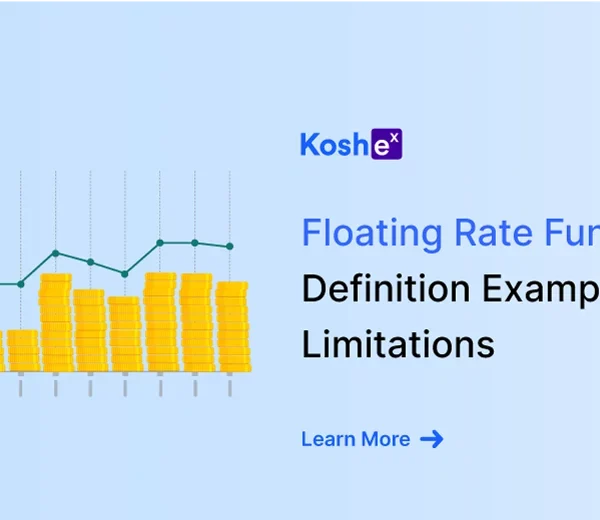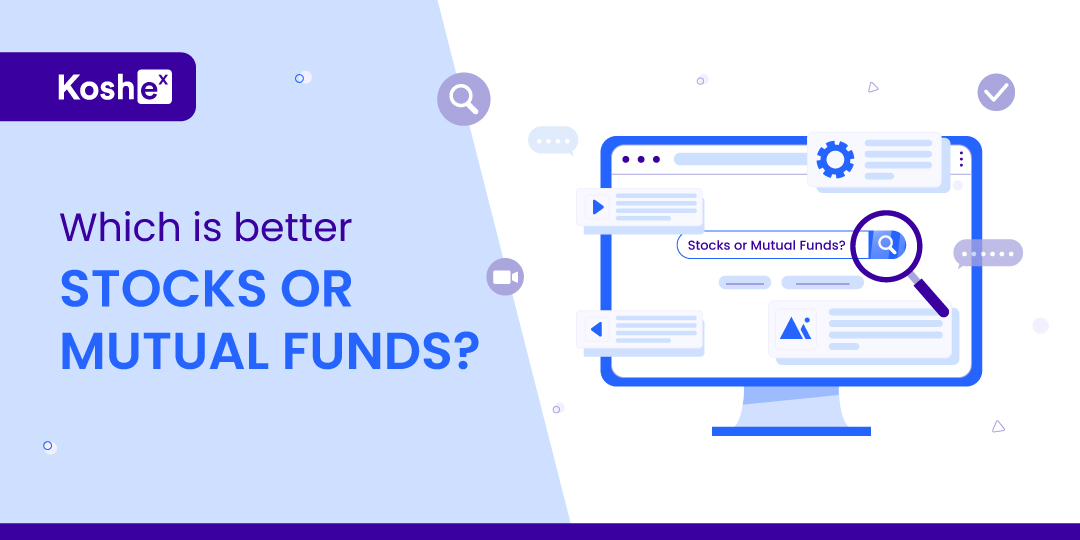Across the world, inflation is causing market turmoil, raising the cost of everything from household essential items including groceries to the prices of flight tickets and hotels.
However, it is not necessary to assume the worst when the short-term economic outlook is bleak. It is a good time to review one’s approach to saving and investing smartly. Learn how Koshex can help you manage your finances during a recession.
In this article, we will discuss eight different investment types that can be used to navigate a recession. By understanding these fund types and their potential benefits, investors can make informed decisions to protect their portfolios and capitalize on opportunities during a recession.
Top Investment Options During Recession
During a recession, investors may want to consider investment options that provide stability and potential for growth. Let us discuss some top options to help investors diversify their portfolios and potentially generate positive returns even during a downturn.
1. Commodities
Investing in commodities during a recession can provide diversification and potentially act as a hedge against inflation. Commodities, such as gold, silver, and oil, tend to hold their value during periods of economic uncertainty. These commodities can provide a store of value when traditional investments, such as stocks and bonds, may be experiencing significant losses.
Moreover, investing in commodities is a good way to potentially protect against the erosion of purchasing power that may occur in such an environment. However, it’s important to note that commodity investing carries unique risks and should be approached cautiously.
2. Dividend Stocks
Investing in dividend stocks during a recession can provide investors with a stable income source, even during market volatility. Companies that pay dividends tend to be more established and have a history of generating consistent profits. This gives investors confidence during uncertain times. Additionally, dividend-paying stocks tend to be less volatile than non-dividend-paying stocks, as investors may be more likely to hold onto them long-term, regardless of market conditions.
3. Money Market Funds
Investing in money market funds during a recession can give investors a haven for cash. These funds invest in short-term, low-risk debt securities, such as government bonds and certificates of deposit, which provide a stable income source and preserve the investment’s principal value.
Money market funds also offer liquidity, meaning investors can quickly access their cash if needed. During a recession, when other investments may be experiencing volatility or declining value, money market funds can provide a stable and secure place to hold cash while waiting for investment opportunities to arise.
4. Large Cap Funds
For several reasons, large-cap funds can be a good investment option during a recession. First, large-cap companies tend to have strong balance sheets and financial stability, which can help them weather economic downturns. Additionally, large-cap stocks are often considered less risky than small-cap or mid-cap stocks, making them a more defensive investment option.
Finally, large-cap companies tend to be well-established and have a proven track record of success, providing investors with confidence and security during uncertain times.
5. Municipal Bond Funds
Investing in municipal bond funds during a recession can be smart for several reasons. Firstly, local governments issue municipal bonds, meaning they are less likely to default compared to corporate bonds. Secondly, the interest income earned from municipal bonds is typically tax-free, which can benefit investors.
Lastly, the demand for municipal bonds tends to increase during a recession as investors seek safer investments, potentially driving up prices and generating positive returns.
6. Utilities Mutual Funds
Utilities mutual funds can be a good investment option during a recession because they typically offer stable returns and lower volatility than other sectors. Utility companies provide essential services, such as electricity, gas, and water, that people and businesses need regardless of economic conditions.
Additionally, these companies typically have regulated prices, which can provide investors with a steady source of income. When investors may seek stability and safety during a recession, utilities mutual funds can offer a defensive strategy with the potential for moderate returns.
7. Hegde Funds
Investing in hedge funds during a recession can potentially provide diversification and downside protection for an investor’s portfolio. Hedge funds can use various investment strategies and instruments, such as short-selling and derivatives, that may allow them to profit in declining markets.
Additionally, hedge funds are often managed by experienced and skilled investment professionals who have the flexibility to adjust their portfolios in response to changing market conditions. However, it’s important to note that hedge funds typically have high fees and may come with greater risks, so careful due diligence and consultation with a financial advisor are recommended before investing in them.
8. High Yield Savings Account
Investing in a high-yield savings account in India during a recession can provide a safe and secure way to earn a relatively high rate of return on your cash savings. High-yield savings accounts typically offer higher interest rates than traditional savings accounts, which can help you earn more money on your savings without taking on additional risk.
A high-yield savings account can be a smart choice for those looking to preserve their capital and earn a decent return during a recession.
Final Words
Investing in the right fund types can help investors navigate a recession and potentially generate positive returns. By understanding these investment types and their potential advantages, investors can make informed decisions to protect their portfolios and capitalize on opportunities during a recession.
A balanced approach is to keep reviewing your portfolio. No investment is completely immune to an economic downturn, and markets are always volatile. Still, there are certain investments, which have historically been more resilient during difficult economic times. By checking data points and trends related to your portfolio, you can take charge of your financial security easily.
However, at times, managing your investments during a recession can be overwhelming, which is why aligning with a reliable platform like Koshex can help you manage your finances. With a user-friendly platform, it is easier to access valuable insights and tools to help you make informed financial decisions.
Don’t let a recession hold you back – take control of your finances and sign up with Koshex to get started!
FAQs
1. Should I stop SIP during a recession?
During a recession, do not discontinue your mutual fund SIPs as you may lose the benefit of Rupee Cost Averaging.
2. What to do in a recession in India?
There are several steps you can take to protect your finances during a recession in India. The first step is to review your expenses and cut back on non-essential spending. After that, focus on building an emergency fund that can cover at least six months of living expenses. Consider investing in low-risk, long-term investments such as fixed deposits, debt funds, and bonds.









Leave a Comment